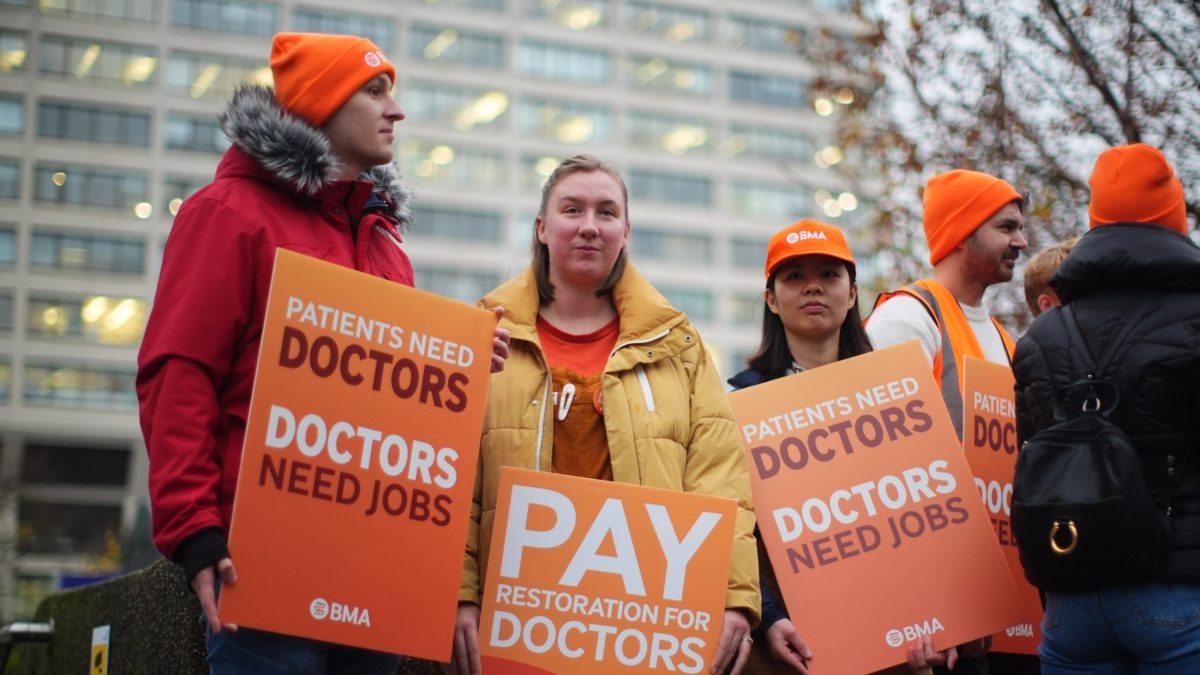Resident doctors went on strike earlier this month demanding a pay rise of up to 26 per cent
As junior doctors conclude another five days of strike action over pay and training contracts, new analysis has suggested that they already receive a guaranteed pension of £125,000 a year.
Critics of the industrial action have pointed out that this is, in some cases, a more generous pot than those working in the private sector might hope to receive.
The data, conducted by wealth management firm Quilter, on behalf of The Times, comes as the British Medical Association say there is an “existential crisis” in the medical profession.
Resident doctors were on strike last week whilst they demanded a 26 per cent pay rise, as well as more training contracts.
How the NHS pension works
Anyone who joins the NHS gets automatic membership to the NHS Pension.
It has been touted as a “great deal” for workers as employee contributions are deducted before tax.
This means that those earning the least effectively only have to contribute 80p for every £1 added to their pension, and someone paying 40 per cent tax only has to contribute 60p for every £1.
Because the NHS pension is a Defined Benefit (DB) scheme unlike most pensions which are Defined Contribution (DC) schemes, it also offers greater security.
This is because there is a set amount that you receive when you retire, unlike DC schemes, where the amount will depend on how well investments perform and is likely to be eroded by inflation.
Contributions under the NHS pension can be likened to a membership fee. How much an employee contributes does not affect the value of the pension, but the more you earn as an NHS worker, the greater percentage of your income you will pay towards the pot.
Will doctors really receive a £125k pension ?
The figure of £125,000 applies to doctors aged 23 who start their first year of foundation year in 2025-26.
As laid out by the NHS pension scheme, from 2015, doctors accumulate 1.85 per cent of their earnings to be stored in their pension pots.
This means that, after ten years, resident doctors will have built up a pension entitlement worth almost £12,000 a year.
Then, if they become a consultant and remain so until retirement at age 65, they could be guaranteed an annual pension of £124,363.
The Institute for Fiscal Studies have said, however, that a “generous” pension pot does little to entice doctors to stay working for the NHS.
Experts have further warned that missing records and a lack of communication has left many employees with no knowledge of how much their pensions are actually worth.
 Last week marked the 13th time junior doctors had walked out during a long-running dispute with the government (Photo: Finnbarr Webster/Getty)
Last week marked the 13th time junior doctors had walked out during a long-running dispute with the government (Photo: Finnbarr Webster/Getty)
Dr Vishal Sharma, chair of the BMA pensions committee, slammed the modelling by Quilter as “highlight misleading and implausible”.
He said that the analysis was “based on improbable assumptions such as a resident doctor always working full time for 43 years when the simple truth is that given the physical and mental demands of a career in medicine, many do not”.
How much do resident doctors get paid ?
In their first foundation year, junior doctors are paid £36,616, with this rising to £42,008 for their second.
Their income is often higher than this, however, as it gets topped up for working overtime or anti-social shifts, for example nights and weekends.
This means that a first year doctor earns £45,900 on average, whilst a specialty registrar doctor normally earns £80,500.
Whilst their pay is above the national median, the BMA have argued that, in real terms, pay for junior doctors has fallen 21 per cent since 2008.
The BMA have arrived at this figure by using the retail prices index (RPI), which some have argued inflates calculations.
Using the consumer price index (CPI), pay for resident doctors has only fallen by 4.7 per cent in real terms, according to the Nuffield Trust.
Even if doctors end up being paid well in comparison to their UK peers, pay abroad remains more desirable.
The BMA have said that there is a “brain drain” on the NHS as junior doctors leave for Australia, where they could earn up to £52,674 a year.
Your next read
How are pensions topped up each year ?
In addition to the 1.85 per cent of their salary locked away in a pension pot under the NHS scheme, doctors also get their pensions topped up by “revaluation”.
This is an increase in line with inflation, plus a further 1.5 per cent.
There is no cap on the maximum number of years doctors can be in the scheme whilst accruing new benefits, a move intended to stop people leaving and offer long-term financial security for those working in healthcare.
What has Wes Streeting said?
Health Secretary Wes Streeting has lambasted the BMA for engaging in “cartel-like behaviour and threatening the future of the NHS”.
Last week, ahead of the planned action, he said the union were holding the Government and the public to ransom.
Speaking at the NHS providers conference in Manchester, he said: “I’m responsible for 1.5 million people in the NHS, not just resident doctors, many of whom have not had a pay rise anything like what resident doctors have had, and many of whom, at the height of their career earnings, will never earn as much as the lowest paid doctor.”
He maintained his position that he would not negotiate on pay as junior doctors had already received pay rises totally 30 per cent in the past three years.
Doctors walked out once more last week after negotiations between the BMA and Streeting broke down.

